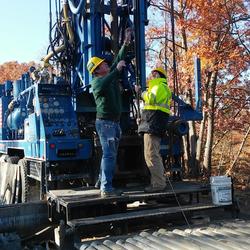Groundwater Quality Monitoring
Groundwater Quality Monitoring
Filter Total Items: 38
Groundwater Flow Modeling - Long Island, New York
Numerical models provide a means to synthesize existing hydrogeologic information into an internally consistent mathematical representation of a real system or process, and thus are useful tools for testing and improving conceptual models or hypotheses of groundwater flow systems. The goal of this effort is to develop a regional model for the Long Island aquifer system to simulate changes in water...
Groundwater Sustainability of the Long Island Aquifer System
The U.S. Geological Survey (USGS) has partnered with the New York State Department of Environmental Conservation (NYSDEC) to conduct a comprehensive study of the Long Island aquifer system. The major findings of this investigation include: The location of the boundary between fresh and salty groundwater is much closer to the shoreline than previously thought. The historical onshore saltwater...
Water-Resource and Road-Condition Monitoring of Alternative Treatments for Road Deicing
Introduction The New York State Department of Transportation (NYSDOT) is evaluating alternative treatments for road deicing with the goal of reducing the impact of this activity on the State’s water resources. The NYSDOT has requested support from the U. S. Geological Survey (USGS) in monitoring the effects of these alternative treatments on the water resources. In the past, the USGS has
Groundwater-Quality of Nassau County, Long Island, New York
Problem Statement There are over 1.3 million residents in Nassau County that rely on groundwater as their sole source of potable drinking water. The mixed land uses (residential, commercial, industrial, agricultural, and recreational) of Nassau County contribute point and non-point sources of aquifer contamination. Nassau County water purveyors currently operate supply wells screened in...
Hydrogeologic and Geochemical Assessment of the Effects of Leakage from the Catskill and Delaware Aqueducts on the Local Bedrock and Overburden Aquifers in Southeastern New York
PROBLEM As part of an effort to sustain a viable water-supply system for 8 million residents in New York City, and 1 million other residents in upstate New York that rely on City water, the New York City Department of Environmental Protection (NYCDEP) has requested a multi-disciplinary study by the U.S. Geological Survey (USGS) to determine the source(s) of water to surface-water sites...
Hydrologic Monitoring in the Central Pine Barrens
The Long Island Central Pine Barrens (CPB) is a large, preserved region of pristine ecological habitat located in eastern parts of Suffolk County, Long Island, NY. The 106,500-acre CPB encompasses portions of the Towns of Brookhaven, Riverhead, and Southampton, and is a core part of the larger Long Island Pine Barrens Maritime Reserve (fig. 1). The CPB overlies portions of Long Island’s federally...
Development of Long Island Water Quality Integrated Data System (LIQWIDS) - User interface and web services in support of collaboration under the Long Island Nitrogen Action Plan(LINAP)
PROBLEM There are more than 60 organizations and agencies collecting water-quality data on Long Island. The types of database management that are used to store and archive regulatory and non-regulatory data vary from paper forms to spreadsheets to State and Federal databases, and there is minimal communication between these systems. As a result, those interested in analyzing data may be...
Ambient Groundwater Quality Monitoring in New York
Over one-third of New York State (NYS) residents rely on groundwater as a potable drinking water source. Understanding the quality of NYS groundwater is important for the protection of public health and security of this resource.
Our Science
The New York Water Science Center conducts research and investigations used across a broad range of industries and other services.
U.S. Geological Survey Hydrologic Monitoring on Long Island, New York
The U.S. Geological Survey (USGS) is a science organization that provides impartial information on the health of our ecosystems and environment, the natural hazards that threaten us, the natural resources we rely on, the impacts of climate and land-use change, and the core science systems that help us provide timely, relevant, and usable information.
Long Island Groundwater Network
U.S. Geological Survey Hydrologic Monitoring on Long Island, New York Groundwater is the sole source of water supply for more than 3 million people on Long Island, New York. Large-scale groundwater pumpage, installation of sanitary- and storm-sewer systems, and frequent variations in precipitation all have significant effects on regional groundwater levels and aquifer storage. In order to properly...
Sentinel Monitoring of Groundwater for Contaminants of Emerging Concern to Provide Advanced Warning for Supply Wells on Long Island, New York
Problem The groundwater supply of Nassau and Suffolk Counties is prone to contamination from past and current land uses, including practices related to agriculture, industry, and residential development, because the soils and underlying sediments are generally composed of sandy, permeable materials that allow contaminants to move readily from the land surface into the groundwater below...













